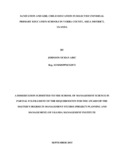| dc.contributor.author | ABIC, Johnson Ochan | |
| dc.contributor.author | SAJJABI, Florence Bakibinga(supervisor) | |
| dc.contributor.author | ATWEBEMBEIRE, Juliet (Supervisor) | |
| dc.date.accessioned | 2017-07-18T08:57:57Z | |
| dc.date.available | 2017-07-18T08:57:57Z | |
| dc.date.issued | 2015-09 | |
| dc.identifier.citation | APA | en_US |
| dc.identifier.other | 13/MMSPPM/32/072 | |
| dc.identifier.uri | http://hdl.handle.net/20.500.12305/187 | |
| dc.description.abstract | ABSTRACT
This study sought to investigate the effect of sanitation on girl child education in Universal Primary Education schools in Vurra County, Arua District, Uganda. Sanitation was the independent variable and girl child education was the dependent variable. Cultural practices are the moderator variable. The theoretical framework underpinning this study was the Stimulus-Response Theory by Edward L. Thorndike (1903). The study reviewed textbooks, training materials, dissertations, reports and journals to further explore the concepts under study and the gaps. A cross sectional survey research design was used. A sample size of 121 comprising district officials, teachers and pupils was reached from 139 elements with 82.7% response rate. Quantitative data was computed by use of Statistical Package for Social Scientists (SPSS) program and qualitative data was triangulated to augment quantitative data. The study used Pearson’s Rank Correlation and the Regression Analysis to determine the correlation between the various dimensions of the independent variable and dependent variable. The study found that there was a strong positive statistically significant (r= 0.534) correlation between sanitary facilities and girl child education. The correlation between hygiene education and girl child education was found to be statistically significant (r= 0.689). The study also revealed a (r= 0.426) moderating effect of cultural practices on the relationship between school sanitation and girl child education. The study recommends that the Ministry of Education, Science, Technology, and Sports (MOESTS) and the Arua District Local Government should initiate programmes to improve sanitary facilities in schools, develop a strong hygiene education programme in schools by scaling up intervention on sanitary pads and education on menstruation management as well as introduce policies that empower women to teach in upper classes. This may provide an avenue that raises alternative perspectives or highlight the specific needs of girls during puberty. | en_US |
| dc.language.iso | en | en_US |
| dc.subject | SANITATION | en_US |
| dc.subject | GIRL CHILD EDUCATION | en_US |
| dc.subject | UNIVERSAL PRIMARY EDUCATION | en_US |
| dc.subject | VURRA COUNTY | en_US |
| dc.subject | ARUA DISTRICT | en_US |
| dc.subject | UGANDA | en_US |
| dc.title | Sanitation and Girl Child Education in selected Universal Primary Education Schools in Vurra county, Arua District, Uganda | en_US |
| dc.type | Book | en_US |

